Sherlock Holmes—brilliant observationist or on the Spectrum? Arguably both. It’s a delicate and challenging endeavor for a writer to honestly, accurately and respectfully portray brain differences in fictional characters. Below are ten masterfully told works of psychological suspense, featuring protagonists with exceptional psychological characteristics. These heroes and heroines use their cognitive gifts to navigate challenging and oftentimes dangerous circumstances and along the way give readers insight into other, creative ways of thinking.
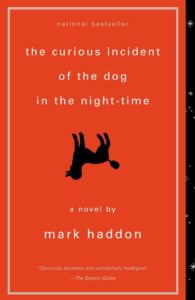
The Curious Incident of the Dog in the Night-Time, by Mark Haddon
“Lots of things are mysteries. But that doesn’t mean there isn’t an answer to them. It’s just that scientists haven’t found the answer yet.”
Gifted, autistic fifteen-year-old, Christopher Boon is mistakenly accused of the murder of Wellington, a neighbor’s beloved poodle. Using the deductive reasoning tactics of his favorite detective, Sherlock Homes, Christopher sets out on a journey to clear his name. Despite his enthusiasm for mathematics and logic Christopher’s search for the truth also takes him out of his private, internal realm into the chaotic, emotional, unpredictable world that he finds so perplexing.
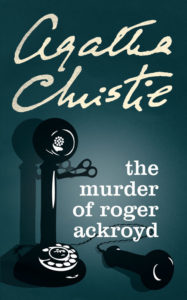
The Murder of Roger Ackroyd, by Agatha Christie
“Why, he’s Hercule Poirot! You know who I mean—the private detective. They say he’s done the most wonderful things—just like detectives do in books.”
Arguably one of the most beloved detectives in literature, Hercule Poirot in The Murder of Roger Ackroyd tackles the case that would make author Agatha Christie a household name. Poirot, brilliant, orderly, fastidious in regard to cleanliness and appearance, has in recent years been described as having obsessive compulsive disorder by armchair psychiatrists. Though OCD was not a recognized diagnosis in the 1920s when the first Poirot novel was written, Poirot uses his attention to detail and his gift to sift through seemingly the most minute clues. In Poirot’s own words, “The truth, however ugly in itself, is always curious and beautiful to seekers after it.”

Little Black Lies, by Sandra Block
“I shut my eyes and try to sleep, but I’ve played this game before, and sleep has no intention of coming, not anytime soon. Sleep is perverse that way, abandoning you just when you need it most.”
Dedicated psychiatrist Dr. Zoe Goldman uses her talents and expertise to help her patients who contend with severe mental illness. Zoe has her own challenges to face—ADHD, a disorder that impacts both her personal and professional lives, a myriad of questions about her past and disjointed memories of a fire that destroyed her family. The first novel in a series that features Zoe, Little Black Lies gives us a protagonist who is relatable, determined and thoroughly endearing. Nightmares plague Zoe and as she tries to understand their origins she comes to realize that a very real and deadly danger is close at hand. Block continues Zoe’s story with two more novels: The Girl Without a Name and The Secret Room.
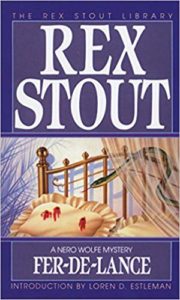
Fer-De-Lance, by Rex Stout
“Compose yourself, Archie. Why taunt me? Why upbraid me? I am merely a genius, not a god. A genius may discover the hidden secrets and display them; only a god could create new ones.”
Rex Stout’s gourmet, orchid-adoring detective, Nero Wolfe, rarely leaves his Manhattan brownstone but with the eyes and legwork of trusty assistant Archie Goodwin they crack the case in Stout’s first Nero Wolfe novel, Fer-De-Lance. While investigating the murders of a metal worker and a college president, agoraphobic Wolfe thwarts an attempt on his own life and uses Archie’s intel along with his own brilliant power of deduction to ferret out a killer.
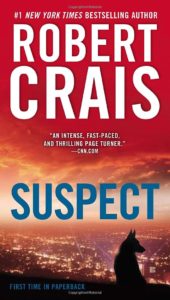
Suspect, by Robert Crais
“Scott walked away and did not look back. They knew Maggie would try to follow him, and she did. In her world, they were a pack, and the pack stayed together.”
Scott James, an LAPD cop, coping with post-traumatic stress disorder after the in-the-line-of-duty death of Stephanie, his partner, is paired with an equally war-traumatized canine named Maggie. The two pair up in order to solve the murder of Stephanie, each willing to die in order to protect the other.

House Rules, by Jodi Picoult
“It’s never the differences between people that surprise us. It’s the things that, against all odds, we have in common.”
Jacob Hunt is a lot like other teens—he’s searching for connections and his place in the world but he also has Asperger’s syndrome which makes connecting with others a challenge. Jacob is obsessed with forensic science, keeps a police scanner in his room, often shows up at crime scenes and offers unsolicited advice to law enforcement. Jacob finds himself at the center of a murder investigation after the body of his social skills tutor is found wrapped in Jacob’s favorite quilt. Desperate to prove his innocence, Jacob’s mother finds her family entangled in a legal system that isn’t always equipped to support individuals with special needs.
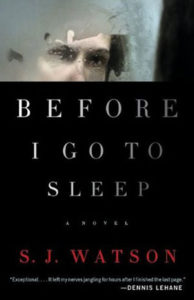
Before I Go to Sleep, by S.J. Watson
“What are we, if not an accumulation of our memories?”
Imagine waking up every morning to a man who claims to be your husband but of whom you have no memory. Christine Lucas begins each day with no recall of the day the before, the week before or years before. Decades earlier, a terrible accident stole her memory and now, with the help of a doctor who encourages Christine to keep a detailed journal, she slowly begins to piece together the events that lead to a shocking truth.

Sharp Objects, by Gillian Flynn
“See, there I am. I told you I lived. I told you I was.”
Camille Peaker is a journalist returning to her hometown to report on the murders of two young girls. Camille reluctantly accepts the assignment knowing that her visit to Wind Gap, MO will dredge up the long-buried childhood traumas that contributed to Camille’s self-harming practices which included etching words into her skin with a razor blade. Through her investigation into the grisly murders, Camille confronts her own demons past and present and comes out the other side, scarred, yes, but whole.

Hunting Annabelle, by Wendy Heard
“Her scream echoes in my memory. I know what happened. Whether anyone believes me or not, I know.”
Set in the early 1980s, Hunting Annabelle introduces us to Sean Suh. Suffering from severe mental illness, Sean served his three-year sentence in a psychiatric prison for murder and has returned home. With medical and psychological intervention, he is making progress and then he meets Annabelle. Finally, someone who can look beyond his past and care for him as the man he has become not who he used to be. Suddenly, Annabelle disappears and suspicion falls to Shaun. About Hunting Annabelle, Author Wendy Heard says, “I’ve always had a lot of interest in the treatment of mental illness in that era. I thought it would be interesting to take a retrospective look at our historical consideration of schizophrenia, and maybe in doing so, the historical context would do the work of dystopian, asking us to meditate on how we treat this mental illness today and what biases we still have about schizophrenics. In this book, the question around mental illness is, “Have we really changed that much?”

The Complete Sherlock Holmes, by Arthur Conan Doyle
“I am a brain, Watson. The rest of me is a mere appendix.”
Did Sherlock Holmes have Asperger’s Syndrome? This has been a question that has been batted around the internet for years. Probably the most famous detective in literary history, Holmes is described as having a preternatural power of observation and deduction, has extensive knowledge of highly specialized topics such as chemistry and all things prints: footprints, fingerprints, hoof prints, and tends to have stilted relationships with others. Holmes finds order where others find chaos. A case for Asperger’s? Maybe. Perhaps Sherlock Holmes best describes himself: “My mind rebels at stagnation. Give me problems, give me work, give me the abstruse cryptogram, or the most intricate analysis, and I am in my own proper atmosphere.”

















